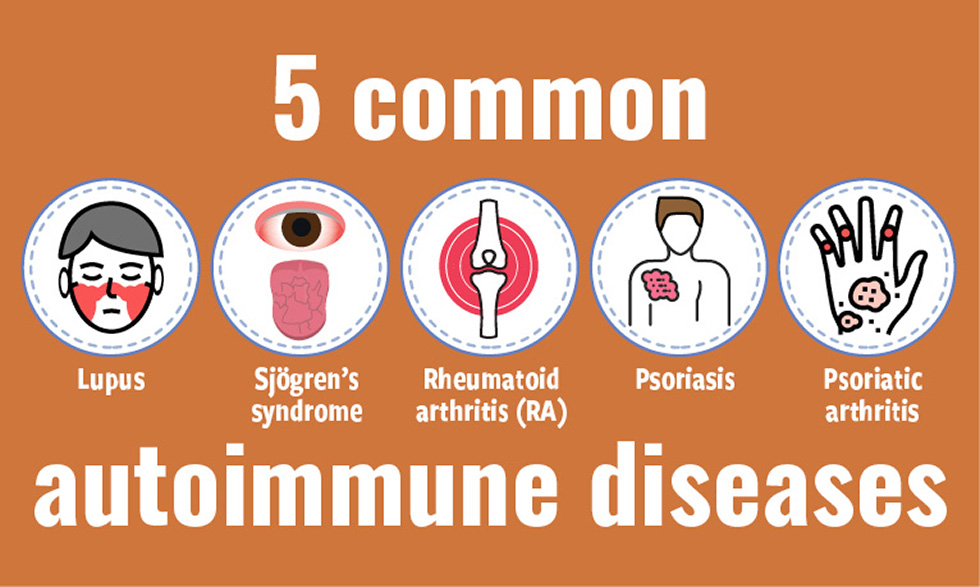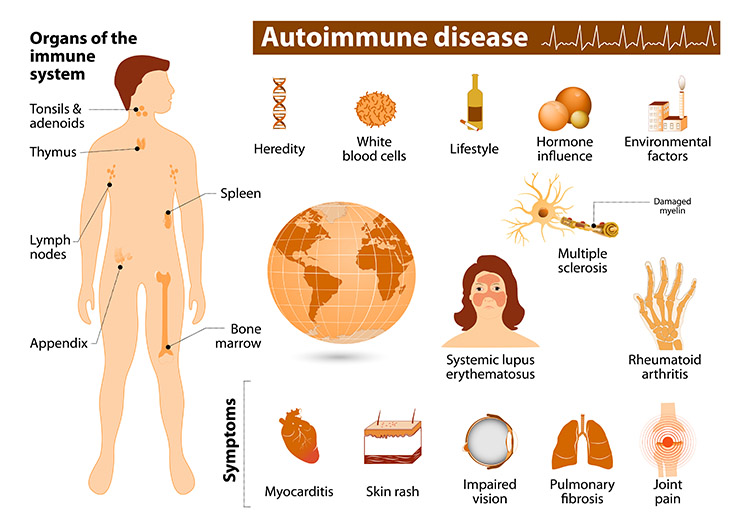
Autoimmune diseases happen when the body’s defense system attacks itself. Usually, the immune system fights germs and viruses. But in autoimmune diseases, it gets confused. It thinks healthy parts of the body are harmful. This causes many problems and makes people feel sick.
There are many types of autoimmune diseases. Each one affects the body in a different way. Some affect the skin, some affect the joints, and others affect organs like the thyroid or kidneys. Let’s learn about the common types of autoimmune diseases. Understanding them helps us know how they work and how they affect people.
Get the insider’s guide to Autoimmune Disease Symptoms: Early Signs You Can’t Ignore.
What is an Autoimmune Disease?
The immune system protects the body from sickness. It kills germs, bacteria, and viruses. But sometimes, the immune system makes a mistake. It attacks the body’s own cells and tissues. This wrong attack causes inflammation and damage.
When this happens, it is called an autoimmune disease. The body fights itself instead of fighting germs. This can cause many health problems. Autoimmune diseases can be mild or very serious. They often last a long time and can be hard to cure.
Common Types of Autoimmune Diseases

Here are some common autoimmune diseases you should know about:
1. Rheumatoid Arthritis (ra)
Rheumatoid arthritis is a disease that affects the joints. The immune system attacks the lining of the joints. This causes pain, swelling, and stiffness. It mostly affects the hands, wrists, and knees. Over time, the joints can get damaged and lose movement.
People with RA may feel tired and weak. It is more common in women than men. RA can start at any age but often begins between 30 and 50 years old.
2. Type 1 Diabetes
Type 1 diabetes happens when the immune system attacks the pancreas. The pancreas makes insulin, a hormone that controls blood sugar. Without insulin, blood sugar levels rise too high. This causes many health problems.
People with type 1 diabetes need insulin shots every day. This disease often starts in children or young adults.
3. Multiple Sclerosis (ms)
Multiple sclerosis is a disease of the brain and spinal cord. The immune system attacks the protective covering of nerve cells. This causes problems with nerve signals. It can lead to muscle weakness, trouble walking, and vision problems. MS affects young adults, mostly women. The symptoms can come and go or get worse over time.
4. Lupus (systemic Lupus Erythematosus)
Lupus is a disease that can affect many parts of the body. The immune system attacks the skin, joints, kidneys, heart, and more. People with lupus may have a rash on their face shaped like a butterfly. Symptoms include tiredness, joint pain, and fever. Lupus is more common in women, especially young adults.
Get the insider’s guide to the Best Memory Foam Pillows for Better Sleep.
5. Hashimoto’s Thyroiditis
This disease affects the thyroid gland in the neck. The immune system attacks the thyroid, making it less active. This causes a slow metabolism, weight gain, and tiredness. Hashimoto’s is a common cause of an underactive thyroid. It mostly happens in women and older adults.
6. Graves’ Disease

Graves’ disease also affects the thyroid but in a different way. The immune system makes the thyroid overactive. This causes weight loss, fast heartbeat, and nervousness. People with Graves’ disease may have bulging eyes. It is more common in women between 20 and 40 years old.
Explore this top-rated option: Successful Aging here.
7. Celiac Disease
Celiac disease is an autoimmune disease that affects the small intestine. The immune system reacts to gluten, a protein in wheat, barley, and rye. This causes damage to the intestine and stops it from absorbing nutrients well.
People with celiac disease may have stomach pain, diarrhea, and tiredness. The only treatment is to avoid gluten in the diet.
Our complete guide to the Best Products for Healthy Aging Tips for Women Over 50 is right here.
8. Psoriasis
Psoriasis is a skin disease. The immune system causes skin cells to grow too fast. This creates thick, red patches with white scales. Psoriasis can be itchy and painful. It can also cause a type of arthritis called psoriatic arthritis. Psoriasis affects people of all ages.
9. Inflammatory Bowel Disease (ibd)
IBD includes two main diseases: Crohn’s disease and ulcerative colitis. Both cause inflammation in the digestive tract. This leads to stomach pain, diarrhea, and weight loss. The immune system attacks the intestines, causing long-term problems. IBD can happen at any age.
10. Sjogren’s Syndrome
Sjogren’s syndrome mainly affects moisture-producing glands. The immune system attacks glands in the eyes and mouth. This causes dry eyes and dry mouth. People with Sjogren’s syndrome may have joint pain and tiredness. It often occurs with other autoimmune diseases.
Get the insider’s guide to Mental Wellness and Cognitive Health for Healthy Aging: Keeping Your Mind Sharp here.
How Are Autoimmune Diseases Diagnosed?

Doctors use many tests to find autoimmune diseases. They ask about symptoms and do physical exams. Blood tests can check for inflammation and specific antibodies. Antibodies are proteins the immune system makes. In autoimmune diseases, certain antibodies attack the body.
Explore this top-rated option: Successful Aging here.
Sometimes, doctors need imaging tests like X-rays or MRIs. These help see damage inside the body. A biopsy, or small tissue sample, may be taken for some diseases.
What Causes Autoimmune Diseases?
The exact cause is unknown. Scientists believe genes and environment play a role. Some people inherit genes that make autoimmune diseases more likely. Infections, stress, and chemicals may trigger the immune system to attack.
Autoimmune diseases are more common in women. Hormones may affect the immune system. They can start at any age but often begin in young adults.
Want more options? Explore our full list of Books on Healthy Aging And Longevity.
Symptoms to Watch For
Symptoms vary by disease but some are common:
- Fatigue or feeling very tired
- Joint pain or swelling
- Muscle weakness
- Skin rashes or changes
- Fever without infection
- Swollen glands
- Digestive problems
If you have these symptoms often, see a doctor. Early diagnosis helps manage the disease better.
Don’t buy VitaMedica Anti-Aging Formula before reading this guide.

Credit: magazine.medlineplus.gov
Treatment of Autoimmune Diseases
There is no cure for most autoimmune diseases. Treatment helps control symptoms and slow damage. Medicines can reduce inflammation and calm the immune system. Common medicines include steroids and immune-suppressing drugs.
Physical therapy and exercise can help with joint and muscle problems. A healthy diet and rest are important. Some diseases need special diets, like celiac disease. Doctors work with patients to find the best plan. Regular check-ups are important to watch for changes.
Our complete guide to Secrets to Healthy Aging for Women is right here.
Living with Autoimmune Diseases
Living with an autoimmune disease can be hard. Symptoms can come and go. Sometimes people feel well, and sometimes sick. Support from family and friends helps a lot.
Many people with autoimmune diseases lead full lives. They learn to manage their health and stay active. It is important to follow the doctor’s advice and take medicines as prescribed.
See our expert reviews of the best Nutrition for Healthy Aging: Fueling Your Body for Longevity.

Credit: www.niehs.nih.gov
Summary Table of Common Autoimmune Diseases
| Disease | Affected Area | Main Symptoms | Who is Affected |
|---|---|---|---|
| Rheumatoid Arthritis | Joints | Pain, swelling, stiffness | Adults, mostly women |
| Type 1 Diabetes | Pancreas | High blood sugar, thirst | Children and young adults |
| Multiple Sclerosis | Brain and spinal cord | Weakness, vision problems | Young adults, mostly women |
| Lupus | Skin, joints, organs | Rash, joint pain, fatigue | Young women |
| Hashimoto’s Thyroiditis | Thyroid gland | Weight gain, tiredness | Women, older adults |
| Graves’ Disease | Thyroid gland | Weight loss, fast heartbeat | Women 20-40 years |
| Celiac Disease | Small intestine | Stomach pain, diarrhea | All ages |
| Psoriasis | Skin | Red patches, scales | All ages |
| Inflammatory Bowel Disease | Digestive tract | Stomach pain, diarrhea | All ages |
| Sjogren’s Syndrome | Moisture glands | Dry eyes and mouth | Adults, mostly women |
Final Thoughts
Autoimmune diseases are complex and affect many people worldwide. They happen when the immune system attacks the body by mistake. Knowing the types helps us understand symptoms and treatments better.
If you or someone you know has symptoms, see a healthcare provider. Early care can improve life quality. With the right support and medicine, people can live well with autoimmune diseases.
Frequently Asked Questions

What Are The Most Common Autoimmune Diseases?
Common autoimmune diseases include rheumatoid arthritis, lupus, type 1 diabetes, and multiple sclerosis.
How Do Autoimmune Diseases Affect The Body?
They cause the immune system to attack healthy cells, leading to inflammation and tissue damage.
Can Autoimmune Diseases Be Cured Or Only Managed?
Most autoimmune diseases cannot be cured but can be managed with medication and lifestyle changes.
What Symptoms Indicate An Autoimmune Disease Might Be Present?
Symptoms often include fatigue, joint pain, swelling, skin rashes, and fever.
Don’t miss our expert guide on The Importance of a Balanced Diet for Elderly Health.






